Deciding on hive material is a foundational choice for any beekeeper. Plastic hives are an excellent option, valued for their exceptional durability, low maintenance requirements, and resistance to common pests and rot. While they have not been found to negatively impact bee colonies, they require a different management approach compared to traditional wooden hives, particularly regarding moisture control.
The question isn’t whether plastic hives are “good,” but whether their specific advantages align with your goals. Plastic excels in durability and operational efficiency, while wood offers tradition and natural breathability. Understanding this core trade-off is the key to making the right decision for your apiary.

The Core Advantages of Plastic Hives
Plastic hive components offer significant practical benefits that directly address many of the chronic challenges associated with wooden equipment.
Unmatched Durability and Longevity
Unlike wood, high-density plastic is non-porous and inert. It does not rot, warp, or degrade when exposed to moisture and weather.
This resistance means a plastic hive can offer a much longer service life than a wooden hive, which requires regular painting and protection from the elements.
Simplified Maintenance and Pest Control
Plastic's non-porous surface is a major advantage for hive hygiene. It is impervious to pests like wax moths, which cannot burrow into the material.
Furthermore, components like plastic frames can be easily cleaned. They can be pressure washed and sanitized for reuse, a process not possible with wooden frames.
Immediate Usability and Efficiency
Most plastic hives come pre-assembled and ready to use out of the box, saving significant time and labor compared to building and wiring wooden frames.
This uniformity and immediacy are especially valuable for beekeepers looking to expand their operations quickly or minimize time spent on equipment preparation.
Impact on Colony Health and Management
The material of the hive directly influences the internal environment and the beekeeper's ability to manage the colony.
Superior Thermal Insulation
Plastic is a poor conductor of heat, which gives it strong insulating properties. This helps maintain a more stable internal temperature.
In colder climates or during the crucial build-up periods of spring and autumn, this insulation can reduce stress on the colony, allowing them to dedicate more energy to brood-rearing rather than temperature regulation.
Easier Brood Inspection
Many plastic frames, particularly for the brood chamber, are manufactured in black or dark colors.
This provides high contrast that makes it significantly easier for the beekeeper to spot tiny, white queen eggs, simplifying hive inspections and confirming the colony is queenright.
Understanding the Trade-offs: Plastic vs. Wood
While plastic offers clear advantages, it is not without its own set of considerations. Objectivity requires acknowledging where wood still holds its own.
Moisture Management and Ventilation
Wood is porous and "breathes," allowing some moisture to escape through the walls of the hive. Plastic is impervious.
This means condensation can build up more easily inside a plastic hive, especially in humid climates or winter. Proper ventilation is absolutely critical in plastic hives to prevent excess moisture, which can stress the colony.
Repairability and Field Adjustments
A cracked or damaged wooden hive body can often be repaired with simple tools, glue, and screws.
Plastic, while more durable overall, is difficult to repair if it does crack or break. A damaged component usually requires complete replacement.
Bee Acceptance and Initial Use
Bees readily build comb on wood. They can sometimes be slower to draw out comb on new plastic foundation.
This is often remedied by applying a thin layer of beeswax to the plastic foundation, which encourages the bees to accept it and begin building.
Making the Right Choice for Your Apiary
The best hive material is the one that aligns with your beekeeping philosophy, environment, and operational scale.
- If your primary focus is minimizing maintenance and maximizing durability: Plastic is the superior choice due to its complete resistance to rot, pests, and weather.
- If your primary focus is scalability and operational efficiency: The ready-to-use, uniform, and easily cleaned nature of plastic hives is ideal for larger apiaries.
- If your primary focus is tradition and natural material properties: Wood remains the classic choice, offering breathability and a customizability that many beekeepers prefer.
Ultimately, understanding the fundamental properties of each material empowers you to select the hive system that best supports your colony's health and your own management goals.
Summary Table:
| Feature | Plastic Hives | Wooden Hives |
|---|---|---|
| Durability | Excellent (rot, pest, and weather resistant) | Good (requires regular maintenance) |
| Maintenance | Very Low (easy to clean, no painting) | High (needs painting, pest control) |
| Thermal Insulation | Superior (better temperature stability) | Moderate |
| Moisture Management | Requires careful ventilation | Natural breathability |
| Initial Setup | Pre-assembled, ready to use | Requires assembly |
Ready to scale your operation with durable, efficient equipment?
At HONESTBEE, we supply commercial apiaries and distributors with high-quality, wholesale-focused beekeeping supplies. Our selection of durable plastic hives is designed to minimize maintenance and maximize your operational efficiency, allowing you to focus on what matters most—your bees.
Contact our wholesale team today to discuss your equipment needs and discover how HONESTBEE can support the growth and success of your business.
Visual Guide

Related Products
- Professional Insulated Plastic Bee Hives
- Beehive Entrance Discs Plastic Bee Entrance Disc for Bee Hives
- 7 x Auto Bee Flow Hive Frames Plastic Beekeeping Hive Box Supplies
- Yellow Plastic Bucket Pail Perch for Beekeeping
- 4 Frame Plastic Nuc Boxes for Beekeeping Bee Nuc Box
People Also Ask
- Why is it necessary to ensure a slight forward tilt when installing a beehive? Best Practices for Hive Drainage
- What are the advantages of plastic bee hives in assembly and maintenance? Maximize Apiary Efficiency
- Are plastic beehives good? The Ultimate Guide to Durability and Low Maintenance
- What is the purpose of a bee box? A Complete Guide to Modern Hive Management
- How does the orientation of the hive sides benefit comb construction? Ensure Straight, Movable Combs for Easier Hive Management



















